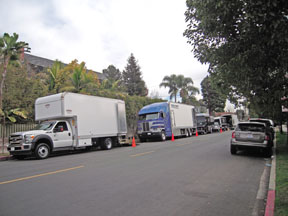Filming in the neighborhood reels in both cash and complaints

VAN NESS AVE. HOME was the scene of filming of a Radio Shack commercial. Eleven trucks on Van Ness and Second Ave. housed equipment, wardrobe and catering supplies.
By Helene Seifer, Columnist
It’s a familiar sight. A row of vans and equipment trucks signaling a film shoot in progress.
Recently such a lineup was stationed outside Tony Filosa’s Highland Ave. home. “It was on my bucket list to one day be on a television show.” And now the retired superior court commissioner is an on-camera legal commentator for Comedy Central’s “Nathan For You.”
Given the seeming ubiquity of film crews, some may be surprised to learn that production in California has dropped 50 percent in the past two decades, according to FilmL.A. Inc., the nonprofit that facilitates film permitting, community relations and neighborhood notifications for much of L.A. county and beyond. Better tax incentives from other states and countries lure production away from Hollywood.
“We love Hancock Park and Windsor Square because there are beautiful mansions with stately trees that don’t look like Southern California,” says Veronique Vowell, location manager for ABC’s Thursday night series “Scandal.”
“During our first three seasons we’ve shot at 10 to 12 different homes there.” Homes on Windsor, Lorraine and Plymouth have stood in for the various communities surrounding Washington, D.C., where the series is set.
Katie Jones, film liaison for the Windsor Square Association, concurs. “The beauty of our architectural design is we can be depicted as anywhere in the world. That is very attractive to film companies. We’ve had over 100 film shoots last year: TV series “Castle,” “Scandal,” “Rake;” commercials for Chevy, Motorola, Samsung, Ford, Walgreen’s, Sony, Microsoft, Disney.”
Hancock Park’s film liaison Cami Taylor has had personal experience with renting to the entertainment industry. Her former home was used in the television series “Lie to Me.” “Film companies try to be very respectful. They put us up in a hotel and put our dogs in a doggy hotel. They gave everyone on the block $100.” One of the biggest productions in the neighborhood is “True Blood.”
Although Sokoloski states that “We get fewer than 10 calls of complaint for every 100 days of production,” there are times when tempers flare. Vowell has had personal experience with that anger. “People are accustomed to production, but there are neighbors that hate filming, no matter what I offer them. We get yelled at. ‘All movie companies are drunks and stay up all night!’” She wants us to understand that “Film companies are not willful marauders coming into communities to rape and pillage! We try to listen to people’s concerns. We are your neighbors. We all want to put our kids through school.” She points out that a single production can support 150 jobs.
Financial benefits
“Real jobs, not just Tom Cruise, but assistants, accountants, editors.”
The fact is, everybody benefits financially from active neighborhood filming. Legions are employed, property holders receive a location fee, and production companies also donate to homeowners’ associations. Vowell explains the varying payments. “Depending on how much we’re doing and how invasive we are, we pay a location fee to the homeowner of $6,000 to $15,000 a day.”
Renting a driveway for their equipment or a backyard for catering can range from $250 to $1,000. “In 2013 we shot approximately 15 days in Hancock Park and Windsor Square and donated $15,000 to $20,000 to the homeowners’ associations.”
“The city is running out of money,” Taylor points out, “Hancock Park uses film fees to take care of stump removal and trim trees that the city used to take care of.” “Film donations are used to lend financial support to the HPOZ,” states Jones. “We planted more than 900 trees, did the Larchmont median, donated to the Historical Society, the annual Garden Tour, Larchmont Boulevard Association and to schools.”
Schools, too, benefit from serving as a location. Dr. Steve Martinez, principal of John Burroughs Middle School, appreciates the extra income his school earned from their six to eight shoots in 2013.
Las Palmas resident Sherry Marks has opened her home to productions on several occasions.
She hosted a three-day shoot for “The Closer,” which contracted to film her living room, front door and backyard.
“All in all it was a positive experience,” she states. “But it’s very disruptive. There’s a lot of people. They’re everywhere. It felt like there were 100 people in my house. Mary McDonnell was sitting in my kitchen on a folding chair. Kyra Sedgewick was on the phone in the breakfast room. They use every inch available. They’re respectful, but they’re much more concerned about their expensive camera, not my paneling.”
She would do it again, and in fact has her property listed with a location agency.
Read the fine print
“The money was really good!” But she advises reading the contract carefully and negotiating changes. “It’s slanted toward the studio. Modify it if there are things you don’t like.”
FilmL.A. Inc. is conducting neighborhood surveys about filming. Windsor Square is one of the next targeted areas.
For more information, or to sign up for e-notifications about nearby shoots go to www.filmLA.com.
By Helene Seifer
Category: Real Estate


